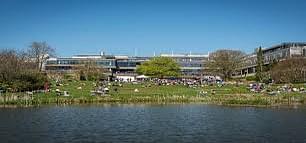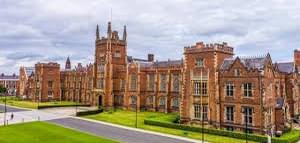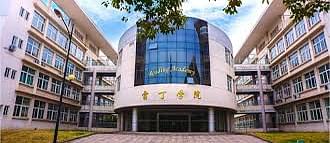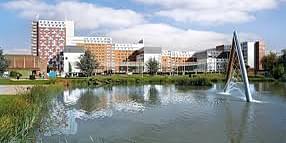Doctor of Philosophy [Ph.D] (Intellectual and Developmental Disabilities)
Field of Study:
₹20.8 L/Yr
Tuition Fees
| Year | 1st Year Fees |
|---|---|
| Tuition Fees | ₹2076480 (GBP 18000) |
In the School of Biosciences, we have a community spirit and students learn with and from each other. We are also renowned for our innovative teaching methods, including:
- new ways of using IT in lectures, which allow you to revisit the teaching at a later date
- academic-developed animations to help explain tricky concepts
- final-year communication projects teaching you how to share scientific knowledge with the public.
Our Biochemistry degree is recognised by the Royal Society of Biology (RSB).
Our degree programme
In your first year, your modules give you an insight into various biological and chemical disciplines, including biochemistry, cell and molecular biology, microbiology and physiology. Your second year builds on this knowledge and covers areas such as gene regulation, cell biology and metabolism.
In your first and second years, you also take specific modules to develop your skills as a bioscientist.
In your final year, alongside your compulsory modules, you conduct a research project. There are three types of project: laboratory; literature and data analysis; or communication. From the many areas of research covered in the School, you can choose to focus on an area that interests you. You also choose two optional modules from a range that covers areas such as the biology of ageing, cancer biology and neuroscience.
Placement year
Your placement year is takenÊbetween your second and final years.ÊItÊprovides an excellent opportunity to gain relevant work experience in industry in the UK or abroad. During your placement you are paid by your employer and produce an independent research project.
Alternatively,Êyou can study or work abroad as part of your degree on our Biochemistry with a Year Abroad degree. You can alsoÊtake our three-year Biochemistry degree, without a year abroad or a sandwich year.
Summer studentships
We also offer between 20 and 30 paid Summer Studentships each year. You can apply to work in our research labs during the summer holiday and gain hands-on research experience before your final year of study.
Extra activities
You can join BioSoc, a student-run society. Previous activities have included research talks and social events.
We also encourage our students to attend outside conferences and events. In 2015, Kent students competed with 280 teams and won the gold medal at the International Genetically Engineered Machine (iGEM) Giant Jamboree in the USA.
Study resources
Our modern teaching labs ensure you have a state-of-the-art working and learning environment. The School attracts a lot of research funding, and this provides for well-equipped research labs and first-class research facilities.
Professional networks
Our school collaborates with research groups in industry and academia throughout the UK and Europe. It also has excellent links with local employers, such as:
- NHS
- GSK
- MedImmune
- Eli Lilly
- Lonza
- Aesica Pharmaceuticals
- Sekisui Diagnostics
- Cairn Research
- Public Health England.
Independent rankings
Biosciences at Kent was ranked 10th for course satisfaction in The Guardian University Guide 2018.
For graduate prospects, Biosciences at Kent was ranked 1st in The Times Good University Guide 2018. Of Biosciences students who graduated from Kent in 2016, 100% were in work or further study within six months, making them the most successful in the UK (DLHE).

Do you think the Rankings are wrong ? Report Here
TOP Scholarships
| Scholarship name | Award amount | Eligibility |
|---|---|---|
| - | - | - |
| - | - | - |
| - | - | - |
Key Resources for Your Study Abroad Journey
Scholarship Grants & Financial Aids
| Name | Scholarship Per Student | Level of Study | Type | |
|---|---|---|---|---|
| BrokerFish International student scholarship | Scholarship per student₹ 1.2 L/Yr$1,000 | Level Of StudyBachelor | TypeMerit-Based | |
| QS scholarships | Scholarship per studentVariable Amount | Level Of StudyBachelor | TypeMerit-Based | |
| Commonwealth Rutherford Fellowship | Scholarship per student₹ 3.6 L/Yr$3,105 | Level Of StudyDoctorate | TypeMerit-Based | |
| Monica Cole Research Grant | Scholarship per student₹ 1.5 L/Yr$1,291 | Level Of StudyApprenticeship | TypeMerit-Based | |
| Commonwealth Professional Fellowship | Scholarship per studentVariable Amount | Level Of StudyDoctorate | TypeMerit-Based | |
| JN Tata Endowment Scholarship | Scholarship per studentVariable Amount | Level Of StudyDoctorate | TypeMerit-Based |
Similar Programs
| Program | Important Date | Total Fees | Median Exams Score | Action |
|---|---|---|---|---|
-- | INR 20.8 L/Yr GBP 18,000 /Yr |
| ||
-- | INR 26.6 L/Yr GBP 23,028 /Yr |
| ||
-- | INR 29.2 L/Yr GBP 25,300 /Yr |
| ||
-- | INR 22 L/Yr GBP 19,093 /Yr |
|
Do you think the Dates are wrong ? Report Here
Similar Colleges


Robert Gordon University


University of Aberdeen


Aberystwyth University


University of Bath


Cranfield University


Queen's University Belfast


Ulster University


University of Reading





























Comments